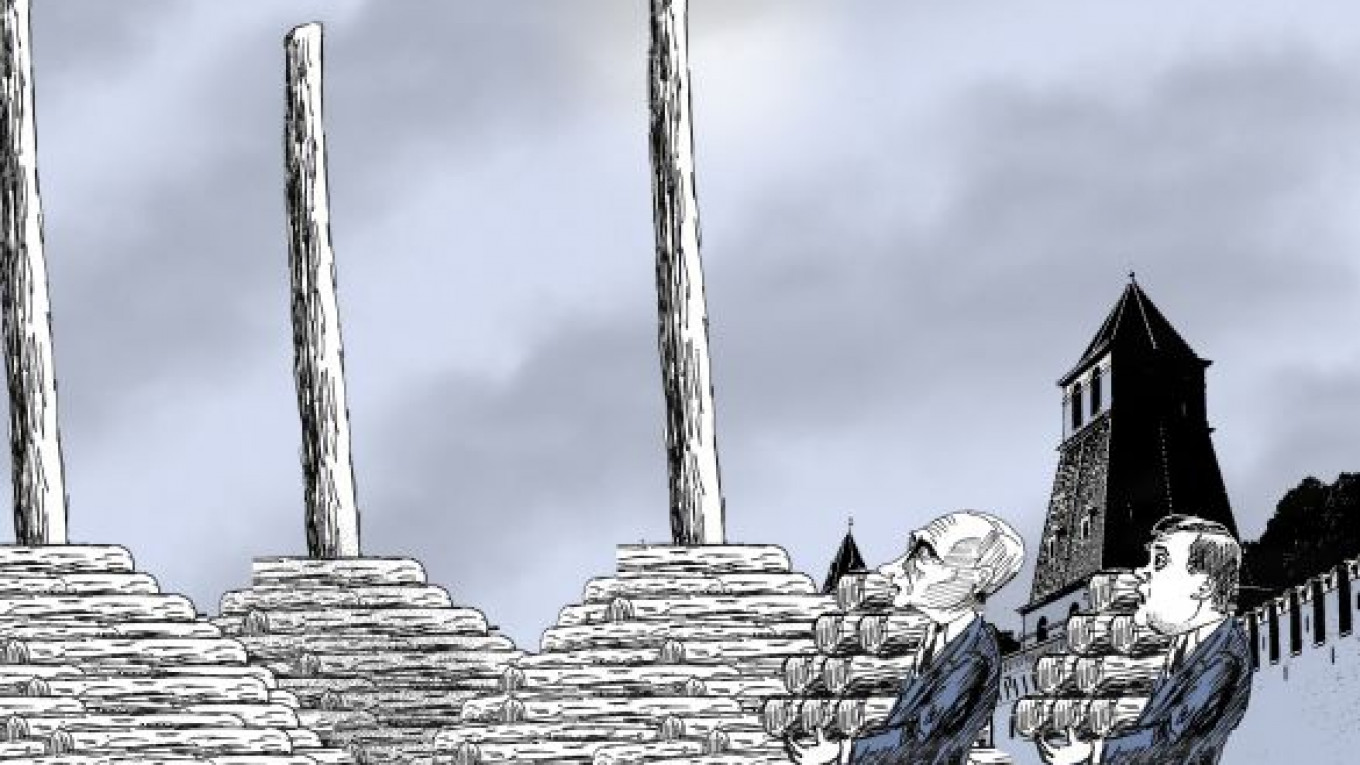Prime Minister Dmitry Medvedev has made his second public statement regarding the Pussy Riot case. His first comment was in an interview to five Russian television networks in April. He said that in carrying out the stunt at Moscow's Christ the Savior Cathedral, the members of Pussy Riot got exactly what they wanted — popularity.
Medvedev offered his second comment on the issue in an interview with The Times of London, published Monday. He quipped that "the young women were lucky" to be tried in Russia. Their fate would have been worse in other countries, he said. What other countries was he referring to? Considering that the Pussy Riot trio is facing up to seven years behind bars — an excessive penalty for hooliganism by any Western standards — perhaps only the Taliban would give them a worse sentence for committing similar acts.
The behavior of the authorities seems irrational. Why are they making an initially absurd scandal even more ridiculous?
By initiating a Middle Ages-style witch hunt against three young women, the Russian Orthodox Church has caused irreparable damage to its reputation in the eyes of the educated class. Meanwhile, nationalists and religious radicals support the church's campaign. Puzzled and perturbed by the actions of church and government officials, intellectuals and cultural figures even wrote a collective appeal in defense of the three girls. Their petition was ignored.
The text of the prosecution's indictment was also from the Middle Ages, repeatedly citing church decisions that were originally adopted from that era. And finally, many observers following the case have concluded that the young women are not being tried for committing the political sin of calling for President Vladimir Putin's resignation, but for blasphemously committing indignities in a Christian holy place. They are de facto being tried for violating "religious statutes" that do not even exist in the Criminal Code and have no place in a country that is defined as secular in the Constitution.
Interestingly enough, if Pussy Riot members had committed the same crime during the Russian Empire — clearly a more conservative era when the church played a more prominent official role in government — they would have faced a sentence of only three to six months.
There is another version of events that suggests the authorities are using the Pussy Riot case to drive a wedge between liberal and conservative opposition camps that had, until now, considered joining forces in the anti-government mass protest movement. Liberals believe that the Pussy Riot members should have been released long ago, while nationalists argue that the women smeared traditional Russian values with their blasphemous act and deserve harsh punishment. If the authorities orchestrating the case against Pussy Riot had hoped it would have this divisive effect, they played their cards correctly.
But I am an advocate of simple explanations regarding the actions of Russia's political elite. In most cases, the simpler the interpretation, the more closely it reflects reality. Russia's leaders lack the vision necessary to strategically plan multiple steps into the future. At best, they can manage one or two moves, but more often their actions are knee-jerk reactions to events and do not reflect complex, strategic maneuvering.
In many respects, the state's crackdown on Pussy Riot is meant to send a strong signal to the nationalists in Russia. This strategy is driven by a belief among Putin's ruling elite that the Soviet Union collapsed because leaders were unable to cope with a rising nationalist mood in the country. Accordingly, ethnic and religious conflict is considered the worst threat facing Russia today. This explains why Putin reacted with such speed and decisiveness to the nationalist riots in Manezh Square two years ago. In his view, nationalist and religious radicalism are interconnected, and he will use harsh measures to nip them in the bud.
This might explain the harsh treatment toward Pussy Riot. The authorities reason that if they release the women or give them too light a punishment, dozens of copy-cat provocations will be carried out in churches, synagogues and mosques across the country, leading to internal strife and a possible meltdown of the Russian state. Although there are many underlying causes behind Russia's interethnic and inter-regional conflicts that can only be resolved through complex and multifaceted efforts, the authorities have traditionally favored implementing quick, punitive and repressive measures over long-term solutions.
In fact, they apply the same approach to many other areas of public life as well. This is why I think the verdict in the Pussy Riot case will strike the liberal and educated segments of Russian society as being unnecessarily cruel.
Georgy Bovt is a political analyst.
Related articles:
A Message from The Moscow Times:
Dear readers,
We are facing unprecedented challenges. Russia's Prosecutor General's Office has designated The Moscow Times as an "undesirable" organization, criminalizing our work and putting our staff at risk of prosecution. This follows our earlier unjust labeling as a "foreign agent."
These actions are direct attempts to silence independent journalism in Russia. The authorities claim our work "discredits the decisions of the Russian leadership." We see things differently: we strive to provide accurate, unbiased reporting on Russia.
We, the journalists of The Moscow Times, refuse to be silenced. But to continue our work, we need your help.
Your support, no matter how small, makes a world of difference. If you can, please support us monthly starting from just $2. It's quick to set up, and every contribution makes a significant impact.
By supporting The Moscow Times, you're defending open, independent journalism in the face of repression. Thank you for standing with us.
Remind me later.







